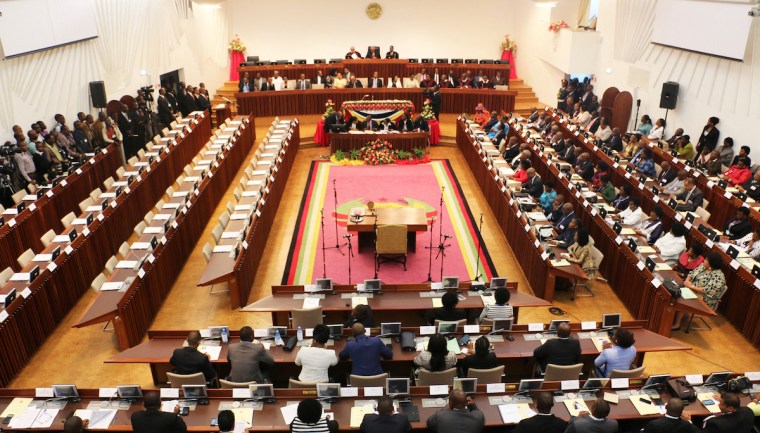New York, June 7, 2022 — Mozambican President Filipe Nyusi should not sign amendments to the country’s anti-terror legislation into law and should instead ask parliament to change a sweeping clause that could criminalize reporting about the insurgency in northern Mozambique, the Committee to Protect Journalists said on Tuesday.
On June 3, the amendment bill was sent to Nyusi for assent, António Boene, the chairman of the National Assembly’s Commission on Constitutional and Legal Affairs, told CPJ via messaging app.
The bill, which was passed by parliament on May 19, seeks to amend Mozambique’s 2018 anti-terror law, including an overly broad clause that would penalize anyone who publicly reproduces false statements relating to terrorist acts with a prison term of between two and eight years, according to media reports and a statement by the Mozambican chapter of the regional press freedom group Media Institute of Southern Africa (MISA).
“Reproducing statements is, after all, one of the hallmarks of journalism,” said Misa-Mozambique in the statement.
The government has argued that the amendments are necessary in order to strengthen the legal framework for the fight against terrorism because of an ongoing insurgency and terrorist attacks in Mozambique’s northern Cabo Delgado province, according to a report by the Mozambican state news agency (AIM) and a government document, reviewed by CPJ, that was introduced in the National Assembly in March 2022.
“Mozambican President Filipe Nyusi must not sign the anti-terror amendment bill into law, but should instead return it to the National Assembly to correct the defects and ensure that reporting on the insurgency in Cabo Delgado is not criminalized or censored,” said Angela Quintal, CPJ’s Africa program coordinator. “Members of parliament have already watered down other controversial clauses in the bill, but the president must ensure they go a step further to protect media freedom and the public’s right to information, instead of trying to control the narrative in Mozambique’s ongoing fight against terrorism.”
On May 18, the National Assembly approved the first reading of the anti-terror amendment bill, which included a controversial clause stating that anyone intentionally spreading information about a terrorist act, if they know the information to be false, can be punished with a prison term of eight to 12 years, according to media reports and CPJ’s review of the bill.
The bill also included prison terms of between 12 and 16 years for anyone who publishes “classified information” about terrorism, according to the AIM report and the draft legislation, reviewed by CPJ.
In a May 17 statement ahead of the first reading of the bill, MISA-Mozambique urged parliament to amend those clauses, saying they threatened press freedom. It said that criminalizing the publication of classified information punished journalists and ordinary citizens, rather than the officials who failed in their duty to safeguard state secrets. The organization also objected to the false information clause, arguing that the wording was ambiguous and had the potential to be applied arbitrarily.
In the bill’s second reading on May 19, the National Assembly’s Commission on Constitutional and Legal Affairs watered down those two clauses by criminalizing the divulging of classified information by public servants only, rather than citizens in general. It also lowered the prison term to between two to eight years for violating the false information clause, according to the AIM report.
Boene said these amendments were approved and the bill was forwarded to the president on June 3 to be signed into law.
Ernesto Saúl, MISA-Mozambique’s program manager, told CPJ in a messaging app call that despite the National Assembly’s efforts to amend some of the clauses, the proposed law could still jeopardize the practice of journalism, particularly by punishing anyone who publicly reproduced statements about acts of terrorism.
“We just have to remember that the government has denied terrorist acts in Cabo Delgado for months after the first reports, and many journalists were at the time accused of spreading lies, so the government can very well use this to silence coverage altogether,” said Saúl.
Moreover, journalists may publish news about plans of imminent attacks that could easily be considered false news by the government, said Saúl.
Adriano Nuvunga, director of the Center for Democracy and Development, a local human rights group, told CPJ via messaging app that the bill was aimed at closing down civic space and was intended to punish and threaten anyone who even discussed terrorism. “It limits the scope of work of the civil society and of journalists, a tendency of the government that was already visible and is a serious setback for the human rights gains that Mozambicans had fought for,” he said.
Emília Moiane, director of the Mozambican government’s information office, told CPJ by phone that she did not believe that the proposed law would violate the right to press freedom, as one of the principles of journalism was to publish only the truth.
“We believe journalists follow this principle. Terrorism is not a subject to talk about without certainty,” said Moiane, who was not able to say when the president was expected to sign the bill into law.
